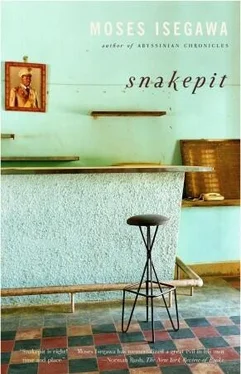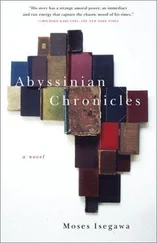Big Bossman, still in his grey suit and blue tie and black Clarks, was flown to the island. It was not an enchanted view that greeted his arrival. The air felt too chilly, too loaded with pollen and the noise of parrots. The sight of his wife in a cage pumped him with confusion, impatience for rescue. He could see that she had given nothing away. He felt a massive jolt of relief. Soon MiG 300 would be here, tearing roofs off houses, cutting trees in half, sending the bastards packing. Within hours of rescue, they would be over the border; within days, they would be on a tropical island sipping rum punch.
Bossman had met his wife at a time when a man begins to doubt whether he will ever meet a soul mate. No white woman wanted to accompany him to Uganda. Many thought he was mad even to suggest it. They quaked when they heard of the killings. And Kate came and everything changed. He always prayed that they die would together, and be buried side by side. He could not see himself continuing without her, getting used to another person or spending his last days alone. Ashes might shake them but would not destroy them. The soldiers had put them in the same room, behind the same bars, and left. The Bossmans held, kissed, talked, cried and encouraged each other as the hours ticked away and birds sang, monkeys howled and other animals called. He forced her to eat, in case they had to run or walk long distances after the rescue. They now felt an intimacy only danger and hysteria can generate. Their lives lay scoured to the core. The night together fortified them; they sucked energy from each gesture, loading their souls for the rough ride to freedom.
Ashes appeared early the next morning. He entered the room, sat on a chair, a Havana in his mouth, a whisky in his hand. He looked tired, dishevelled, manic.
“Where is my money? I have given you a whole night to remember the details and put together a credible story.”
Nothing was forthcoming from Mr. and Mrs. Bossman, as the Witherthrushes liked to be called in their days of power, except stubborn silence.
Ashes called the Pounder. The giant man came feeling with his free hand the weight of a metre-long pestle, smooth as an egg. The woman was held down and the man started to work on her feet. Two blows and they were gone. She fainted, frothed, and oozed all over the place. The exercise lasted barely four seconds; it was so fast that Bossman could hardly believe it had occurred. He hardly had time to swallow, cough and speak up. At that moment he knew that his world lay in ruins. Ashes wanted their lives and the money, if possible. He would get one, not both. In another four seconds the woman’s arms were gone. Bossman soiled himself and let out a long tortured wail that would have chilled the blood of less hardened mortals. Ashes barely took notice.
By this time Bossman was kneeling on the ground, hitting his palms on the floor with uncontrolled grief. The speed of his descent from cocky British businessman to dejected, pathetic old man was blinding. He felt angry with himself for having underestimated his fellow Englishman. He had been too confident of the protection of the local British Embassy, who were among his customers; contacts in the British government in London; friendly generals in the Uganda army; his connections in the murky world of business; his reputation as a tough guy who not only faced down dictators but made lesser men cringe and do his will. It was all gone, reduced to straw in the wind by this odious man with the cigar and the large nose.
Ashes looked at his former conspirator reduced to a miserable wretch and drew no satisfaction from the sight. In future I will be more careful, less trusting, he thought angrily. Whoever I do business with, be it a Britisher, American or Greenlander, will have to earn my trust. I will follow them like a shadow. Nobody will have any benefit of the doubt. It struck Ashes that maybe the two had been counting on a rescue. It almost made him laugh. By whom? And how? Short of Amin, who was out of the country, intervening, he saw nobody with the balls to tackle him at all, least of all on home turf. At the end of it all, he realized that he did not care any more what his captives had or had not been planning or expecting.
He stood up, spat at Bossman, and left the room. At the door he turned round and said, “Maybe she will tell you where my money is.”
Bossman was left in the cage with his wife, or what remained of her. He knew what was in store for him unless MiG 300 acted quickly. Where was he? Today was the day of the rescue. Where were the plane and the helicopter? Where had they been when these animals were killing his wife? He felt he owed it to her to survive and raise their son and avenge her death. As the hours seeped away and the place started to be oppressed by the stink of death and the roar of flies, he realized that they had made a serious miscalculation. They had assumed that Ashes would drop the case for fear that Amin would get wind of it. As boss of the sanctimonious Anti-Smuggling Unit, he could not afford to be implicated in swindling the government he was chosen to defend from corruption. It turned out that he was a man not afraid to take his chances. It was too late to regret chances of escape not taken. Suddenly, he knew that General MiG 300 was not coming. Nobody in his right senses could dare challenge Ashes’ might in so frontal a manner. He let out a very loud cry of despair.
IN THE MEANTIME, Ashes sent his men to Bossman’s home to check every leaf of paper and spread and split every piece of property where information might have been concealed. They went to his office and gave it the same treatment. They checked his list of friends and turned their homes upside down. They came away empty-handed, covered in dust and mites. Ashes wanted to arrest the directors of Barclays Bank, but even he realized that the move would stir more trouble than he could handle. In self-defence, the bankers might release some very compromising information. He parked his car in front of the bank and violent thoughts ran through his mind. How he would have loved to shoot those banker bastards and bomb the building to the ground! But he knew better. He watched the traffic speeding up and down Kampala Road, cars full of soldiers and soldiers’ wives and relatives, agents of security organizations, expatriates working for embassies, civilians going about their business, and cursed them all for being unable to help him to recover his lost millions. He hawked deep in his throat and sent a huge yellow-green gob flying out of the window. It landed on a man walking past who, when he saw who had spat on him, just kept walking. Ashes threw his arms in the air in utter despair and headed for the island.
That night he stormed the cage and released Mr. Bossman who, weighed down by grief and ulcers, looked ancient and less imposing than his bulk normally permitted. He led him to the woods and made him collect small logs in a field. All around them insects chirped, sawed, harked. Now and then an animal cried as it warned others or celebrated catching its supper. Bossman was oblivious to it all, moving like an automaton, mechanically, jerkily. When quite a heap had been collected, Ashes led him back into the cage and made him carry his wife to the field.
“Say goodbye and a few prayers for her soul. It is a privilege I give you, old friend,” Ashes sneered.
Helped by the Pounder, whose face betrayed no emotion and whose movements were cat-like in their speed and coordination, Bossman piled logs on his wife, tears flowing down his face. A guard brought a jerrycan of petrol, poured it on the wood, made sure he was on the right side of the wind, and struck a match. The flames leaped and roared.
Ashes was delighted for the first time that day. He started whistling, “He has the whole world in his hands. .”
Читать дальше











